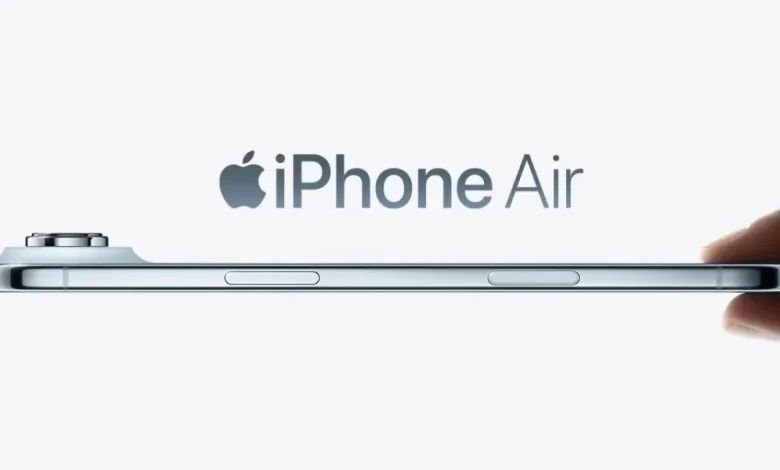Apple reportedly punts on the next iPhone Air

Good morning. Word on the Hill is that the U.S. government may soon reopen for business.
It’s been a long time coming. At 42 days and counting, it’s by far the longest shutdown in American history.
Before the Senate passed the bill that paves the way for an end to the standoff—the House must also pass the measure, and President Trump must sign it—I asked today’s prevailing AI chatbots when they thought the government might reopen.
One refused to answer. A second said “likely in the next few days.” The best answer was “between November 11 and 13, 2025,” provided “no major surprises occur.” (Ah yes, 2025, the year of no political surprises.)
Just a reminder that the federal cybersecurity agency, tech procurement contracts, H1-B visa processing, and regulatory activity—plus, y’know, flights coast to coast—are hanging in the balance. NBD!
Today’s tech news below. —Andrew Nusca
Want to send thoughts or suggestions to Fortune Tech? Drop a line here.
Apple reportedly punts on the next iPhone Air
A 2025 promotional image for Apple’s first-generation iPhone Air.
Courtesy Apple
Apple needs a breath before it puts out the next iPhone Air.
The $999 thin-and-light model was supposed to fill out the product portfolio the same way its inspiration, the MacBook Air, once did. (That is: Not quite as cheap as the base model, not quite as expensive as the “Pro” model.)
But sales have proven lackluster as consumers find that their hearts lie with bigger batteries and better audiovisual capabilities, given the price.
A new report from The Information says Apple will now delay the release of the next iPhone Air, due a year from now, to rework the formula.
Presumably, that will mean different tradeoffs.
Though there’s not much to be done about battery life in this format—unless someone plans to bend the laws of physics—one can imagine Apple trying to save a few cents in less prominent places in a bid to tilt the “value” meter in its favor.
Alternatively, the company could just put its base iPhone—already quite a bit thinner and lighter than its Pro sibling—on a diet and brand it “Air.”
There’s no shame in that game: Today the slim MacBook Air, once the top of its line, now sits at the bottom of the company’s Mac range but is responsible for 2 in 5 Macs sold. —AN
EU may force member states to ditch Huawei, ZTE tech
The European Union’s executive branch reportedly wants to force member states to scrub Chinese telecommunications tech from their communications networks.
Gear made by Huawei and ZTE—considered high-risk vendors—is in the legal line of fire, according to a new Bloomberg report.
National governments, not the EU, have final say over infrastructure decisions. But the European Commission reportedly seeks to make a 2020 recommendation a legally binding requirement that would come with financial penalties for noncompliance.
“The EU is increasingly focused on the risks posed by Chinese telecom equipment makers as trade and political ties with its second-largest trading partner fray,” the report reads. “The concern is that handing over control of critical national infrastructure to companies with such close ties to Beijing could compromise national security interests.”
China’s Foreign Ministry previously said that there was little factual basis for the EU to label Huawei and ZTE as “high risk.” Whatever the case, local companies like Sweden’s Ericsson and Finland’s Nokia stand to benefit. —AN
So long, Meta ‘like’ and ‘share’ buttons (sort of)
Meta said Monday that it will discontinue use of its “like” and “share” buttons on external websites. They’ll remain in place on Meta’s own channels.
The company says it will turn externally embedded Facebook controls into zero-by-zero-pixel elements so as not to break web pages the world over.
The change, planned for February 10, 2026, comes as usage of the plugins has declined to unspecified levels. “The digital landscape has evolved,” the company notes in a blog post for software developers.
The buttons were first introduced in 2010—a time when social media networks were more favorable to content published elsewhere and keen to drive engagement on their platform.
(What did the digital landscape look like then? Justin Bieber’s debut album, the first Apple iPad, and the utter domination by the TV series Glee. Ah, mem’ries.)
Today’s Meta would much prefer you to engage with its AI chatbot. The silver lining? The World Wide Web is still going strong…for now. In 2025 Facebook remains a Top 10 website, as it did in 2010, with almost 10 billion monthly visits. —AN
More tech
—Rumble will acquire Northern Data. The Canadian video platform will buy the German AI infrastructure company in an up to $970M deal.
—CoreWeave handily beats on Q3 results. $1.36 billion in expectations-beating revenue and a net loss of $110 million, down from last year’s $360 million.
—C3.ai may decide to sell, or at least fundraise, in the wake of CEO Thomas Siebel’s exit.
—AI errors are growing in legal briefs. A “rising tide of AI slop” including references to cases that don’t exist.
—TSMC sales slowest in 20 months. Is the AI boom slowing down, or just taking a beat?
—Klook files for IPO. The APAC travel booking service lost about $141 million on $407 million of revenue this year.
—Apple hides China’s most popular gay dating apps. Blued and Finka get axed from App Store listings in the wake of a Beijing order.
This is the web version of Fortune Tech, a daily newsletter breaking down the biggest players and stories shaping the future. Sign up to get it delivered free to your inbox.





